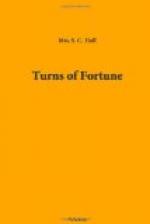“I will give you a promise; but receive none,” said the generous lover. “I should be indeed miserable if I, for a moment, fancied you were controlled only by a promise. I rely upon you solely and entirely; no matter with what temptations you may be surrounded. If Helen is so much admired, you must be admired also; but I do not fear you will forget me; for now my only astonishment is how I could have preferred the spirit and power of the one to the tender and womanly grace of the other.” In the midst of these effusions, so dear to lovers’ hearts, Mrs. Myles entered. Many and many a time had she prayed that Edward Lynne might transfer his affections to Rose Dillon; it would be such “a capital match for her, poor thing.” She would repeat to herself, “Yes, quite the thing for her, though, of course, for Helen I could not hear of it—yet quite the thing of all others for her.” This frame of mind continued until the invitation arrived, and it was determined that Rose should visit her cousin. “It is,” argued the good woman in her own way, “it is only to nurse her strong and well again, I dare say; but yet, who knows, she may see some one, or some one may see her? She certainly is a very pretty, modest-looking girl; and I have heard say that modest-looking girls are sometimes greatly admired among the grandees in fashionable places, because of their rarity. I shall certainly show the cold shoulder to Edward Lynne the next time he comes, and give him a hint as to the expectations I have for Rose. I must not suffer the poor child to throw herself away—oh no!—oh no! Edward Lynne is a very nice young man certainly; and if Rose had not been going to London”— She opened the parlour door as she so reasoned; and the peculiar expression which passed over the countenances of both, convinced her that every thing was proceeding in opposition to her “prudential motives.” Edward frankly expounded all, to her entire dissatisfaction. “She did not,” she said, “at all approve of engagements; she would not sanction any engagement except at the altar; she thought Mr. Lynne (Mr. Lynne! she had never in her life before called him any thing but “Ned”) she thought he ought to have spoken to her first as became a gentleman.” And Edward, provoked beyond bearing at what always upstirs a noble soul—mere worldly-mindedness—replied, “that he never professed to be a gentleman; he was, and ever would be, a farmer, and nothing more; and for all that, he thought a farmer—an honest, upright, English farmer—might have as correct ideas as to right and wrong as any gentleman.” At this Mrs. Myles became very indignant; like the frog in the fable, she endeavoured to think herself an ox, and talked and looked magnificence itself, until at last she felt as if being her grand-children was enough to entitle Helen and Rose to sit before a queen. She talked of Edward,—his occupation, his barns, his cows, horses, and sheep—until




